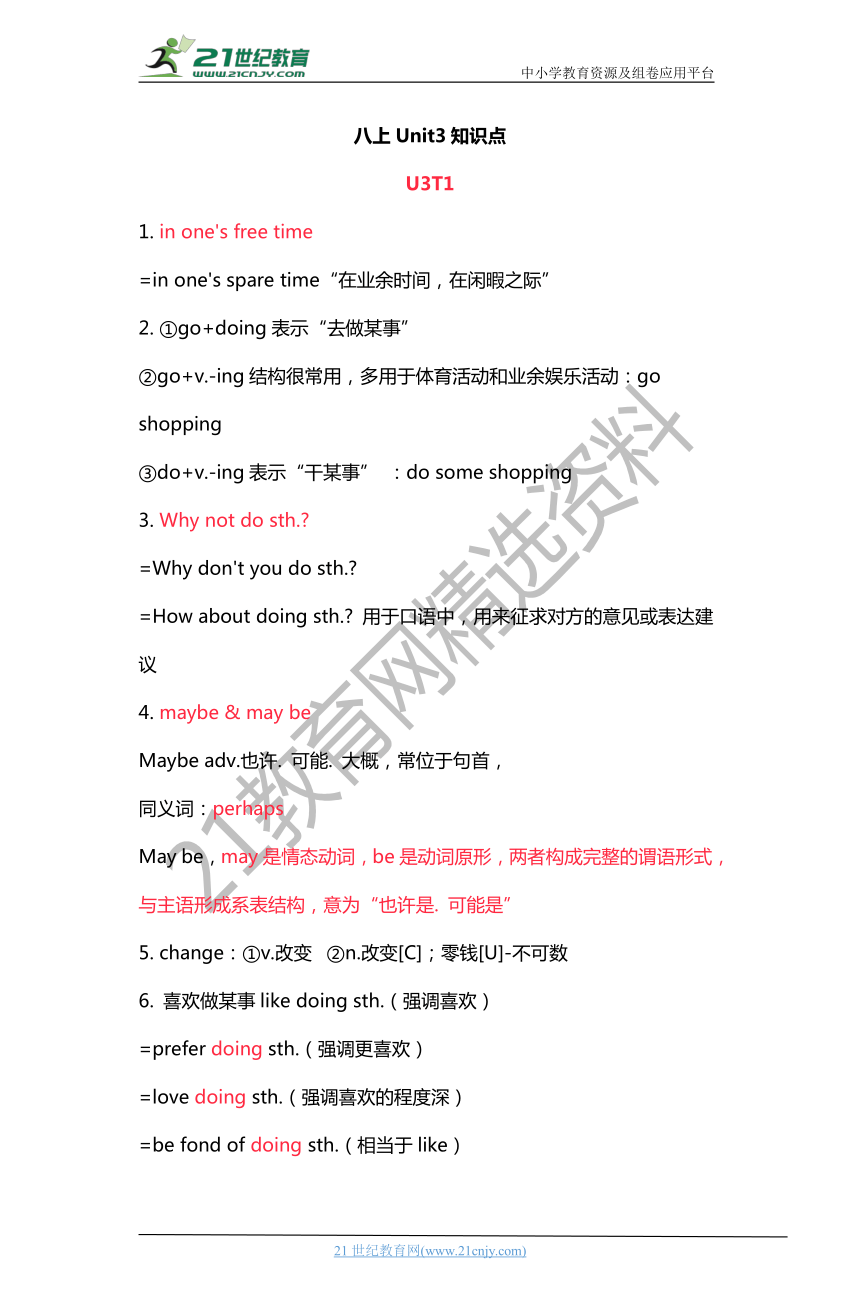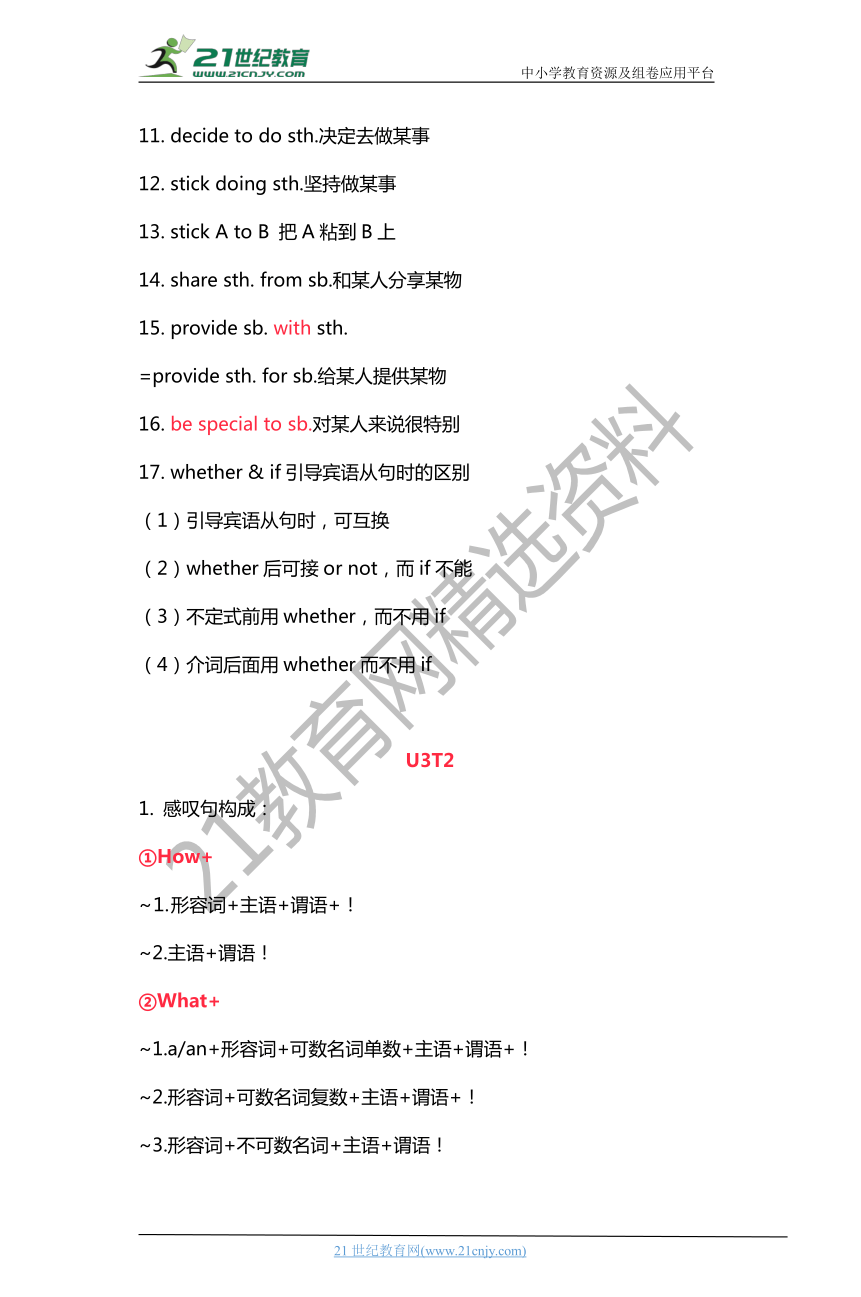Unit 3 Our Hobbies 知识点汇总
文档属性
| 名称 | Unit 3 Our Hobbies 知识点汇总 |  | |
| 格式 | zip | ||
| 文件大小 | 1.2MB | ||
| 资源类型 | 试卷 | ||
| 版本资源 | 仁爱科普版 | ||
| 科目 | 英语 | ||
| 更新时间 | 2020-07-01 18:27:02 | ||
图片预览





文档简介
中小学教育资源及组卷应用平台
八上Unit3知识点
U3T1
1.?in
one's
free
time
=in
one's
spare
time“在业余时间,在闲暇之际”
2.
①go+doing表示“去做某事”
②go+v.-ing结构很常用,多用于体育活动和业余娱乐活动:go
shopping
③do+v.-ing表示“干某事”
:do
some
shopping
3.?Why
not
do
sth.?
=Why
don't
you
do
sth.?
=How
about
doing
sth.?
用于口语中,用来征求对方的意见或表达建议
4.?maybe
&
may
be
Maybe
adv.也许.
可能.
大概,常位于句首,
同义词:perhaps
May
be,may是情态动词,be是动词原形,两者构成完整的谓语形式,与主语形成系表结构,意为“也许是.
可能是”21cnjy.com
5.
change:①v.改变?
②n.改变[C];零钱[U]-不可数
6.
喜欢做某事like
doing
sth.(强调喜欢)
=prefer?doing?sth.(强调更喜欢)
=love?doing?sth.(强调喜欢的程度深)
=be
fond
of?doing?sth.(相当于like)
=be
interested
in?doing?sth.(更强调于乐趣)
=enjoy?doing?sth.(强调享受的喜欢)
7.
某人在闲暇时间内经常做什么?
What
do
sb.
often
do
when
sb.
be
free?(时间状语从句)
=What
do
sb.
often
do
when
sb.
have
time?(时间状语从句)
8.
rent:①rent
sb.
sth.
=rent
sth.
to
sb.把某物租给某人
②rent
sth.
from
sb.从某人处租到某物
拓展:从某人处借到某物(借进来):borrow
sth.
from
sb.
把某物借给某人(借出去):lend…
sth.
to
sb.
长时间借(延续性):keep
9.
used
to(动词不定式)
do:过去常常做某事(现在不做了)
否定:didn't
use
to
do
sth.=used
not
to
do
sth.(不常用)
一般疑问句:did
sb.
use
to
do
sth.?
=used
sb.
to
do
sth.?(不常用)
答语:Yes,
sb.
did./No,
sb.
didn't.或Yes,sb.
used./No,sb.
usedn't(不常用)21·cn·jy·com
特殊疑问句:What
did
sb.
use
to
do?
Attention:be
used
to(介词)doing
sth.?习惯于做某事
10.
learn:
①vt.Ⅰlearn
sth.
from
sth./sb.从某人或某物处学到…??
Ⅱ
learn
from…向…学习
②learn…by
heart用心记住…
11.
decide
to
do
sth.决定去做某事
12.
stick
doing
sth.坚持做某事
13.
stick
A
to
B
把A粘到B上
14.
share
sth.
from
sb.和某人分享某物
15.
provide
sb.?with?sth.
=provide
sth.
for
sb.给某人提供某物
16.?be
special
to
sb.对某人来说很特别
17.
whether
&
if引导宾语从句时的区别
(1)引导宾语从句时,可互换
(2)whether后可接or
not,而if不能
(3)不定式前用whether,而不用if
(4)介词后面用whether而不用if
U3T2
1.
感叹句构成:
①How+
~⒈形容词+主语+谓语+!
~2.主语+谓语!
②What+
~1.a/an+形容词+可数名词单数+主语+谓语+!
~2.形容词+可数名词复数+主语+谓语+!
~3.形容词+不可数名词+主语+谓语!
2.
kind
of+可数名词复数,表示“…的种类”
3.
be
popular
with
sb.“…受某人的欢迎/喜爱”
be
famous
for
=be
known
for
因…而出名(出名原因)
be
famous
as
=be
well
known
as以某种身份而出名,被公认为…
4.?everyday=daily?(adj.)“日常的,普通的”,只作定语
every
day“每天”,常作状语
5.
at
the
age
of…
=when
sb.
was
...years
old“在(某人)…岁时”?
6.?开始做某事start
to
do
sth.
=start
doing
sth.
=begin
to
do
sth.
=begin
doing
sth.
7.
as+形容词或副词原级+as“和…一样”
否定:not
as…as或not
so…as
8.
make
sb.
sth.
=make
sth.
for
sb.为某人制作某物
9.
bring
sth.
for
sb.
=bring
sb.
sth.为某人带某物
10.
own(adj.):①放名词所有格后
Eg:Is
this
Maria's
own
idea?
②放形容词性物主代词后
Eg:I
have
my
own
study
at
home.
③of
one's
own某人自己的某物
④on
one's
own独自,相当于by
oneself
Own(v.):拥有(合法拥有)
Eg:Who
owns
Pang
Donglai
Shopping
Hall?
U3T3
1.
Hold
the
line.
=Wait
a
moment.
=Wait
a
second.
=Wait
a
minute.等一下
2.
chat(过去式chatted,一般分词:chatting)with
sb.和某人聊天
3.
过去进行时使用条件:过去某一时间点
(?http:?/??/?www.21cnjy.com?)或时间段发生的事情或存在的状态(过去某时间段内的持续性动作),时间状语:at
xx
o'clock,
at
this/that
time/moment,
then,
when,
while,
from
xx
o'clock
to
xx
o'clock……21教育网
4.?agree:①agree
to(prep.)
sth.(一件建议或计划安排)
②agree
on
sth.(要确定一件事,双方达成一致意见)
③agree
with
sb.(sb.'s
idea)同意某人(某人的想法)
④agree
to
do
sth./agree
that+从句“同意做某事”
5.?pleased(adj.)(某人)高兴的,喜欢的,满意的
①be
pleased
at/about
sth.对某事感到满意的
②be
pleased
with
sb.
对某人感到满意的
③be
pleased
to
do
sth.
很满意去做某事
pleasure[U]愉快,高兴,满足
please
adv.请?
?vt.使(某人)满意
pleasant:令人愉快的,舒适的(物为主语)
6.?no
one“没有一个人”,作主语时,谓语动词用单数,回答由Who引导的问句
none(全部否定)?指没有人(或物),作主语时,谓语动词单复数均可,回答由How
many或How
much引导的问句www.21-cn-jy.com
Attention:?Not
all是不完全否定,即部分否定
7.
voice[C]嗓音?
&
sound[U/C]泛指一切声音?
&
noise[U]噪音
8.?match
①n.火柴,比赛,相配的人(或物)(比game更正规的比赛,game带有游戏性)
②v.把…配对
Match
A
with
B“把A和B配对”
9.
a/
an+序数词,“又一,再一”
the+序数词,强调先后顺序
10.?died:①He
died(v.).强调死的瞬间
②He
was
dead(adj.)
for
two
days.强调死了的状态
③He
is
dying(v.).强调奄奄一息
④His
death(n.)
made
me
sad.
11.?be
afraid
to
do
sth.害怕去做某事
12.
at
church在教堂(做礼拜)
at
the
church在教堂(不一定做礼拜)
go
to
church
去教堂(做礼拜)
go
to
the
church
去教堂(不一定做礼拜)
13.?however
&
but
However(adv.)可以单独使用,后面加逗号,一般放置于句首
But(conj.)不可以单独使用,后面没有逗号,一般放置于句中,后面加句子
14.?at
the
beginning
of…“在…的开始”
the
beginning
of…“…的开始”
15.
亲密的朋友是用close而不是closed
Unit3
topic
1
1.
“喜欢做某事”+
doing
sth.?
enjoy
like
love?
be
fond
of
be
interested
in
2.
_______________+动词原形
Why
not=why
don’t
you,?
would
you
please,?
had
better,?
make,
let,?
help
后+动词原形
3.
maybe/
may
be.
maybe:?副词,意思是“也许、可能”
may
be:?may情态动词,be是动词原形,意为“也许是、可能是”。
如:Maybe
she’ll
come
this
afternoon.
她可能今天下午来。
He
may
be
in
the
office.?
实战演练:请用maybe/may/may
be
填空
王诗龄
is
crying.
_______she
is
hungry
now.
王诗龄
is
crying.
she
_______be
hungry
now.
王诗龄
is
crying.
she
_______
hungry
now.
答案:Maybe,may,may
be
4.?Must提问,否定回答用needn’t
和don’t
have
to
Eg:
He
isn’t
in
his
bedroom.
He
must
be
in
the
study
room.
实战演练
The
book___
Tom’
s.
It
has
his
name
on
it.(A)
A.
must
be
B.
may
be
C.
can’t
be
D.
can
be
5.?used
to
“过去常常”否定句
“didn’t
use
to
do”
?Be\get
used
to
doing习惯
6.
“提供”
?provide
sb.
with
sth.
?provide
sth.
for
sb.
7.
and
he
doesn’t
mind
whether
they
are
good
or
not.
whether
.....or
not是否whether
固定搭配
or
not
if是否,不能和or
not
连用
Topic
2
What
sweet
music!
1.
v.
sound系动词
+
adj./
n.
“听起来……”?
Hear
听见
listen
to
听
n.?sound声音
e.g.
The
story
sounds
interesting.
I
heard
a
strange
sound.
4.
lend
“借给别人”lend
sb.
sth.?
或
lend
sth.
to
sb.→
过去式lent
borrow“向别人借”borrow
sth.
from
sb.?
keep
“保持,保留”延续性动词keep
+
一段时间,回答how
long引导的特殊疑问句中
5.
三餐球类不加冠词,西洋乐器+the
play
+
the
+
乐器
e.g.
play
the
violin
/
drum
/
piano
/
guitar?
play
+
球类名词?
e.g.
play
basketball
/
volleyball
/
baseball
/
soccer
/
football?
6.
最喜欢:
like...best...
最喜欢……?
=
be
...
favorite
e.g.
Liu
Ming
like
Pop
music
best.?
=
Pop
music
is
Liu
Ming’s
favorite.
7.?be
famous
for因……而著名
?be
famous
as
以某种身份而著名
e.g.
Suzhou
is
famous
for
the
gardens.
苏州以园林而著称。
She
is
famous
as
a
woman
scientist.她作为一名女科学家扬名天下。
8.
be
born
出生于
be
born
in
+
地点
出生于某地
9.
in/on/at区别
in
+
(年、月、季节、泛指某天早上中午下午)on
+
具体的某一天
(星期)
at+时间点
10.?at
the
age
of
...
在某人……岁时,相当于when
he
/
she
was
...
years
old.21世纪教育网版权所有
Topic
3
What
were
you
doing
at
this
time
yesterday?
1.
when/while
(1)
此处while
=
when?意为
“当……的时候”,引导时间状语从句。
拓展:when
与
while
区别
?延续性动词(表示一段时间)【从句用进行时】
?when
+?短暂性动词(表示一个时间点)【从句用一般过去时或一般现在时】
?while
+
延续性动词【从句用进行时】
While
/
When
I
was
having
supper,
someone
knocked
at
the
door.
When
you
leave
the
room,
please
turn
off
the
lights.
(2)while:然而?
2.?call
sb.
(up
)
ring
sb.
(up)?
phone
sb.“打电话给某人”?
give
sb.
a
ring?
call
sb.
at
+
电话号码
3.
not
...
until
...
“到……时候才;在……以前不……”
4.
agree
动词,意为“同意,应允”。
反义词为disagree,名词agreement/disagreement
agree
with
sb.“同意某人的观点”
agree
to
do
sth.
“同意做某事”
agree
on
/
about
sth.“关于某事取得一致意见”?
5.?A+序数词,表示“又一,再一”the+序数词“第几”
6.?too
……
to
意为“太……以至不能……”
So...that
“如此....以至于”
7.
stop
doing
sth.
“停止做某事”
(停止正在做的事)
stop
to
do
sth.
“停下来去做某事”(停下目前做的事去做另一件事)
拓展:stop
sb.
(from)
doing
sth.
“阻止某人做某事”
21世纪教育网
www.21cnjy.com
精品试卷·第
2
页
(共
2
页)
HYPERLINK
"http://www.21cnjy.com/"
21世纪教育网(www.21cnjy.com)
八上Unit3知识点
U3T1
1.?in
one's
free
time
=in
one's
spare
time“在业余时间,在闲暇之际”
2.
①go+doing表示“去做某事”
②go+v.-ing结构很常用,多用于体育活动和业余娱乐活动:go
shopping
③do+v.-ing表示“干某事”
:do
some
shopping
3.?Why
not
do
sth.?
=Why
don't
you
do
sth.?
=How
about
doing
sth.?
用于口语中,用来征求对方的意见或表达建议
4.?maybe
&
may
be
Maybe
adv.也许.
可能.
大概,常位于句首,
同义词:perhaps
May
be,may是情态动词,be是动词原形,两者构成完整的谓语形式,与主语形成系表结构,意为“也许是.
可能是”21cnjy.com
5.
change:①v.改变?
②n.改变[C];零钱[U]-不可数
6.
喜欢做某事like
doing
sth.(强调喜欢)
=prefer?doing?sth.(强调更喜欢)
=love?doing?sth.(强调喜欢的程度深)
=be
fond
of?doing?sth.(相当于like)
=be
interested
in?doing?sth.(更强调于乐趣)
=enjoy?doing?sth.(强调享受的喜欢)
7.
某人在闲暇时间内经常做什么?
What
do
sb.
often
do
when
sb.
be
free?(时间状语从句)
=What
do
sb.
often
do
when
sb.
have
time?(时间状语从句)
8.
rent:①rent
sb.
sth.
=rent
sth.
to
sb.把某物租给某人
②rent
sth.
from
sb.从某人处租到某物
拓展:从某人处借到某物(借进来):borrow
sth.
from
sb.
把某物借给某人(借出去):lend…
sth.
to
sb.
长时间借(延续性):keep
9.
used
to(动词不定式)
do:过去常常做某事(现在不做了)
否定:didn't
use
to
do
sth.=used
not
to
do
sth.(不常用)
一般疑问句:did
sb.
use
to
do
sth.?
=used
sb.
to
do
sth.?(不常用)
答语:Yes,
sb.
did./No,
sb.
didn't.或Yes,sb.
used./No,sb.
usedn't(不常用)21·cn·jy·com
特殊疑问句:What
did
sb.
use
to
do?
Attention:be
used
to(介词)doing
sth.?习惯于做某事
10.
learn:
①vt.Ⅰlearn
sth.
from
sth./sb.从某人或某物处学到…??
Ⅱ
learn
from…向…学习
②learn…by
heart用心记住…
11.
decide
to
do
sth.决定去做某事
12.
stick
doing
sth.坚持做某事
13.
stick
A
to
B
把A粘到B上
14.
share
sth.
from
sb.和某人分享某物
15.
provide
sb.?with?sth.
=provide
sth.
for
sb.给某人提供某物
16.?be
special
to
sb.对某人来说很特别
17.
whether
&
if引导宾语从句时的区别
(1)引导宾语从句时,可互换
(2)whether后可接or
not,而if不能
(3)不定式前用whether,而不用if
(4)介词后面用whether而不用if
U3T2
1.
感叹句构成:
①How+
~⒈形容词+主语+谓语+!
~2.主语+谓语!
②What+
~1.a/an+形容词+可数名词单数+主语+谓语+!
~2.形容词+可数名词复数+主语+谓语+!
~3.形容词+不可数名词+主语+谓语!
2.
kind
of+可数名词复数,表示“…的种类”
3.
be
popular
with
sb.“…受某人的欢迎/喜爱”
be
famous
for
=be
known
for
因…而出名(出名原因)
be
famous
as
=be
well
known
as以某种身份而出名,被公认为…
4.?everyday=daily?(adj.)“日常的,普通的”,只作定语
every
day“每天”,常作状语
5.
at
the
age
of…
=when
sb.
was
...years
old“在(某人)…岁时”?
6.?开始做某事start
to
do
sth.
=start
doing
sth.
=begin
to
do
sth.
=begin
doing
sth.
7.
as+形容词或副词原级+as“和…一样”
否定:not
as…as或not
so…as
8.
make
sb.
sth.
=make
sth.
for
sb.为某人制作某物
9.
bring
sth.
for
sb.
=bring
sb.
sth.为某人带某物
10.
own(adj.):①放名词所有格后
Eg:Is
this
Maria's
own
idea?
②放形容词性物主代词后
Eg:I
have
my
own
study
at
home.
③of
one's
own某人自己的某物
④on
one's
own独自,相当于by
oneself
Own(v.):拥有(合法拥有)
Eg:Who
owns
Pang
Donglai
Shopping
Hall?
U3T3
1.
Hold
the
line.
=Wait
a
moment.
=Wait
a
second.
=Wait
a
minute.等一下
2.
chat(过去式chatted,一般分词:chatting)with
sb.和某人聊天
3.
过去进行时使用条件:过去某一时间点
(?http:?/??/?www.21cnjy.com?)或时间段发生的事情或存在的状态(过去某时间段内的持续性动作),时间状语:at
xx
o'clock,
at
this/that
time/moment,
then,
when,
while,
from
xx
o'clock
to
xx
o'clock……21教育网
4.?agree:①agree
to(prep.)
sth.(一件建议或计划安排)
②agree
on
sth.(要确定一件事,双方达成一致意见)
③agree
with
sb.(sb.'s
idea)同意某人(某人的想法)
④agree
to
do
sth./agree
that+从句“同意做某事”
5.?pleased(adj.)(某人)高兴的,喜欢的,满意的
①be
pleased
at/about
sth.对某事感到满意的
②be
pleased
with
sb.
对某人感到满意的
③be
pleased
to
do
sth.
很满意去做某事
pleasure[U]愉快,高兴,满足
please
adv.请?
?vt.使(某人)满意
pleasant:令人愉快的,舒适的(物为主语)
6.?no
one“没有一个人”,作主语时,谓语动词用单数,回答由Who引导的问句
none(全部否定)?指没有人(或物),作主语时,谓语动词单复数均可,回答由How
many或How
much引导的问句www.21-cn-jy.com
Attention:?Not
all是不完全否定,即部分否定
7.
voice[C]嗓音?
&
sound[U/C]泛指一切声音?
&
noise[U]噪音
8.?match
①n.火柴,比赛,相配的人(或物)(比game更正规的比赛,game带有游戏性)
②v.把…配对
Match
A
with
B“把A和B配对”
9.
a/
an+序数词,“又一,再一”
the+序数词,强调先后顺序
10.?died:①He
died(v.).强调死的瞬间
②He
was
dead(adj.)
for
two
days.强调死了的状态
③He
is
dying(v.).强调奄奄一息
④His
death(n.)
made
me
sad.
11.?be
afraid
to
do
sth.害怕去做某事
12.
at
church在教堂(做礼拜)
at
the
church在教堂(不一定做礼拜)
go
to
church
去教堂(做礼拜)
go
to
the
church
去教堂(不一定做礼拜)
13.?however
&
but
However(adv.)可以单独使用,后面加逗号,一般放置于句首
But(conj.)不可以单独使用,后面没有逗号,一般放置于句中,后面加句子
14.?at
the
beginning
of…“在…的开始”
the
beginning
of…“…的开始”
15.
亲密的朋友是用close而不是closed
Unit3
topic
1
1.
“喜欢做某事”+
doing
sth.?
enjoy
like
love?
be
fond
of
be
interested
in
2.
_______________+动词原形
Why
not=why
don’t
you,?
would
you
please,?
had
better,?
make,
let,?
help
后+动词原形
3.
maybe/
may
be.
maybe:?副词,意思是“也许、可能”
may
be:?may情态动词,be是动词原形,意为“也许是、可能是”。
如:Maybe
she’ll
come
this
afternoon.
她可能今天下午来。
He
may
be
in
the
office.?
实战演练:请用maybe/may/may
be
填空
王诗龄
is
crying.
_______she
is
hungry
now.
王诗龄
is
crying.
she
_______be
hungry
now.
王诗龄
is
crying.
she
_______
hungry
now.
答案:Maybe,may,may
be
4.?Must提问,否定回答用needn’t
和don’t
have
to
Eg:
He
isn’t
in
his
bedroom.
He
must
be
in
the
study
room.
实战演练
The
book___
Tom’
s.
It
has
his
name
on
it.(A)
A.
must
be
B.
may
be
C.
can’t
be
D.
can
be
5.?used
to
“过去常常”否定句
“didn’t
use
to
do”
?Be\get
used
to
doing习惯
6.
“提供”
?provide
sb.
with
sth.
?provide
sth.
for
sb.
7.
and
he
doesn’t
mind
whether
they
are
good
or
not.
whether
.....or
not是否whether
固定搭配
or
not
if是否,不能和or
not
连用
Topic
2
What
sweet
music!
1.
v.
sound系动词
+
adj./
n.
“听起来……”?
Hear
听见
listen
to
听
n.?sound声音
e.g.
The
story
sounds
interesting.
I
heard
a
strange
sound.
4.
lend
“借给别人”lend
sb.
sth.?
或
lend
sth.
to
sb.→
过去式lent
borrow“向别人借”borrow
sth.
from
sb.?
keep
“保持,保留”延续性动词keep
+
一段时间,回答how
long引导的特殊疑问句中
5.
三餐球类不加冠词,西洋乐器+the
play
+
the
+
乐器
e.g.
play
the
violin
/
drum
/
piano
/
guitar?
play
+
球类名词?
e.g.
play
basketball
/
volleyball
/
baseball
/
soccer
/
football?
6.
最喜欢:
like...best...
最喜欢……?
=
be
...
favorite
e.g.
Liu
Ming
like
Pop
music
best.?
=
Pop
music
is
Liu
Ming’s
favorite.
7.?be
famous
for因……而著名
?be
famous
as
以某种身份而著名
e.g.
Suzhou
is
famous
for
the
gardens.
苏州以园林而著称。
She
is
famous
as
a
woman
scientist.她作为一名女科学家扬名天下。
8.
be
born
出生于
be
born
in
+
地点
出生于某地
9.
in/on/at区别
in
+
(年、月、季节、泛指某天早上中午下午)on
+
具体的某一天
(星期)
at+时间点
10.?at
the
age
of
...
在某人……岁时,相当于when
he
/
she
was
...
years
old.21世纪教育网版权所有
Topic
3
What
were
you
doing
at
this
time
yesterday?
1.
when/while
(1)
此处while
=
when?意为
“当……的时候”,引导时间状语从句。
拓展:when
与
while
区别
?延续性动词(表示一段时间)【从句用进行时】
?when
+?短暂性动词(表示一个时间点)【从句用一般过去时或一般现在时】
?while
+
延续性动词【从句用进行时】
While
/
When
I
was
having
supper,
someone
knocked
at
the
door.
When
you
leave
the
room,
please
turn
off
the
lights.
(2)while:然而?
2.?call
sb.
(up
)
ring
sb.
(up)?
phone
sb.“打电话给某人”?
give
sb.
a
ring?
call
sb.
at
+
电话号码
3.
not
...
until
...
“到……时候才;在……以前不……”
4.
agree
动词,意为“同意,应允”。
反义词为disagree,名词agreement/disagreement
agree
with
sb.“同意某人的观点”
agree
to
do
sth.
“同意做某事”
agree
on
/
about
sth.“关于某事取得一致意见”?
5.?A+序数词,表示“又一,再一”the+序数词“第几”
6.?too
……
to
意为“太……以至不能……”
So...that
“如此....以至于”
7.
stop
doing
sth.
“停止做某事”
(停止正在做的事)
stop
to
do
sth.
“停下来去做某事”(停下目前做的事去做另一件事)
拓展:stop
sb.
(from)
doing
sth.
“阻止某人做某事”
21世纪教育网
www.21cnjy.com
精品试卷·第
2
页
(共
2
页)
HYPERLINK
"http://www.21cnjy.com/"
21世纪教育网(www.21cnjy.com)
同课章节目录
- Unit 1 Playing Sports
- Topic 1 I'm going to play basketball.
- Topic 2 I'll kick you the ball again.
- Topic 3 The school sports meet is coming.
- Unit 2 Keeping Healthy
- Topic 1 You should brush your teeth twice a day.
- Topic 2 I must ask him to give up smoking.
- Topic 3 Must we exercise to prevent the flu?
- Unit 3 Our Hobbies
- Topic 1 What's your hobby?
- Topic 2 What sweet music!
- Topic 3 What were you doing at this time yesterday
- Unit 4 Our World
- Topic 1 What's the strongest animal on the farm?
- Topic 2 How can we protect ourselves from the eart
- Topic 3 The Internet makes the world smaller.
